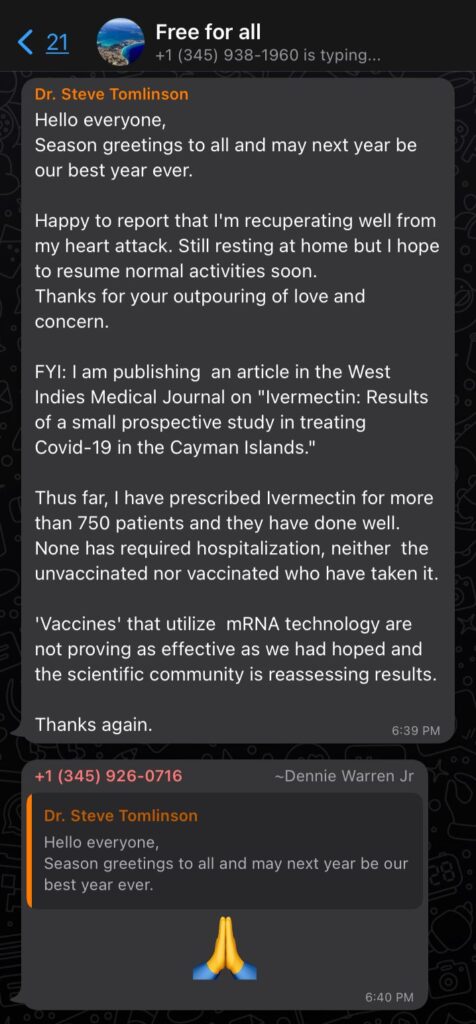44 patients experienced adverse events (AE) with 33 of them being from the ivermectin group. Six patients discontinued ivermectin, and 3 withdrew from the study owing to AEs.
(CMR) A randomized clinical trial released on Friday by the Journal of the American Medical Association (JAMA) concluded that the use of Ivermectin, an anti-parasite drug, does not reduce the risk of severe disease in patients with mild to moderate COVID-19 and comorbidities. This comes despite the fact that physicians in the Cayman Islands continue to prescribe the medication claiming that it has had extraordinary results.
Dr. Steve Tomlinson shared in late December that he would be publishing an article in the West Indies Medical Journal on his successful use of Ivermectin in the Cayman Islands to treat COVID-19 patients. Dr. Tomlinson has claimed to have treated “more than 750 patients” and that “they have done well” with none requiring hospitalization.
He shared that none of his patients had been hospitalized despite the fact that at least two given Ivermectin prescriptions by Dr. Tomlinson subsequently died of COVID-19. There is no indication of when his article will be available and subject to peer review.

CMR attempted to confirm if Ivermectin has been approved by any medical regulatory body in the Cayman Islands. However, the Dental and Medical Council (DMC) which falls under the Department of Health Regulatory Services has not responded to numerous emails. The HSA has shared that they do not prescribe Ivermectin for non-label use.
Despite his position, Malaysian researchers did a study from May 31 to October 25, 2021, with 490 enrolled patients with mild to moderate illness at 20 hospitals and a COVID-19 quarantine center in Malaysia. All patients received standard care, but half the patients were treated with ivermectin for five days.
According to the study, 21.6% of the patients' given ivermectin developed a severe illness compared to 17.3% of those who received only standard care and also developed a severe illness, the researchers said. The findings concluded that ivermectin administered during the first week of illness did not reduce the risk of developing severe disease compared with standard of care alone.
The study's findings do not support the use of ivermectin for patients with COVID-19.
Severe illness was defined as patients who needed supplemental oxygen.
The study acknowledged that some early clinical studies suggested the potential efficacy of ivermectin in the treatment and prevention of COVID-19 but most were abandoned because of methodologic weaknesses. The issues were point out in an article in the BMJ Journal where it noted that:.

The Malaysian study by contrast used the gold standard for double blind tests studies. It was a randomized, control group based on an investigator-blinded randomization list. The dosage of Ivermectin was calculated precisely based on 6mg and 12mg whole tablets. The clinical history of patients and other anthropometric measurements, blood samples, kidney and liver profiles, C-reactive protein levels, and chest radiography were obtained at baseline and then again following treatment.
Patients were enrolled who were most likely to have severe COVID-19 including those over 50.
Ivermectin is approved by the Food and Drug Administration to treat infections of roundworms, lice and other tiny parasites in humans. The FDA has tried to debunk claims that animal-strength versions of the drug can help fight COVID-19, warning that taking it in large doses can cause nausea, vomiting, diarrhea, seizures, delirium and even death.
- Fascinated
- Happy
- Sad
- Angry
- Bored
- Afraid



































